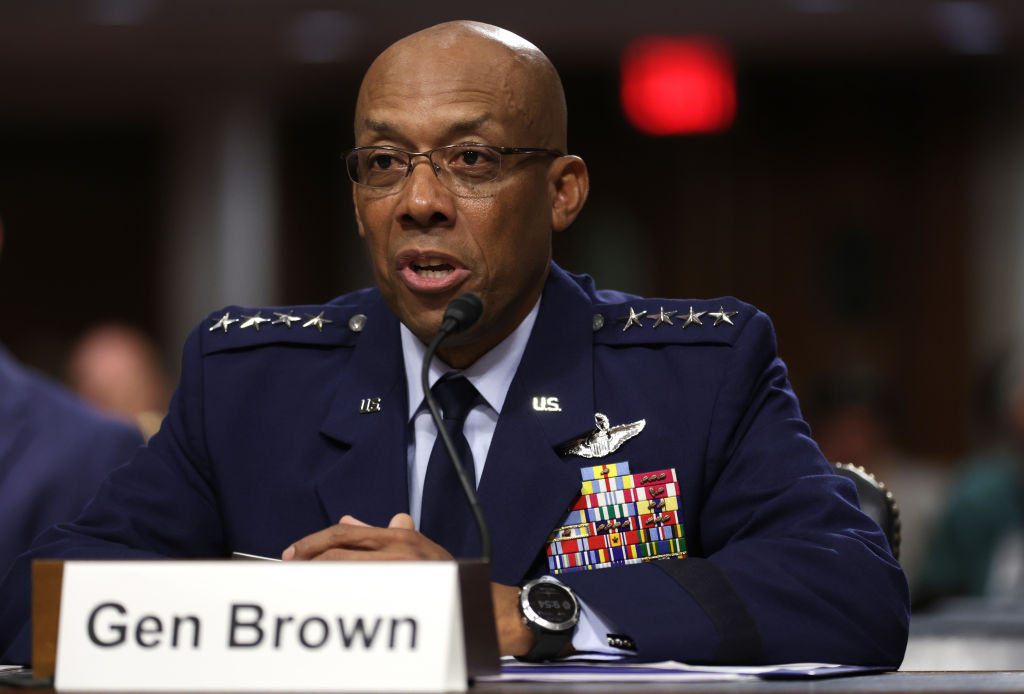Happy Monday! The New York Yankees on Friday announced the reversal of the team’s longstanding prohibition on beards, allowing players to sport “well-groomed” facial hair for the first time in decades.
You know what? If the Yankees can get past their stodgy ways, so can we. Grayson, go ahead with that soul patch you’ve been bugging us about.
Quick Hits: Today’s Top Stories
- Israel on Saturday welcomed home six hostages—Tal Shoham, Omer Shem Tov, Omer Wenkert, Eliya Cohen, Avera Mengistu, and Hisham al-Sayed—after more than 500 days in terrorist captivity. The men, who appeared emaciated upon their release, were believed to be the final living abductees scheduled for release as part of the first phase of the U.S.-brokered ceasefire deal between Israel and Hamas. On Friday, Hamas handed over the body of Shiri Bibas after previously sending to Israel unidentified remains in her place. Upon their examination, forensic scientists concluded that Shiri, like her sons Ariel and Kfir—just 4 years old and 9 months old at the time of their abduction from their Nir Oz home—had been murdered in captivity, not killed in an Israeli airstrike as Hamas previously claimed. Meanwhile, Israel on Sunday delayed the release of 600 Palestinian prisoners in response to Hamas’ “humiliating ceremonies” during the handover of hostages.
- The Israel Defense Forces (IDF) sent a platoon of tanks to the West Bank on Sunday, the first such deployment since 2002 and part of the military’s intensified operation against terrorist cells in the territory. Israeli Defense Minister Israel Katz said Sunday that IDF troops would remain in some of the cleared refugee camps in the northern West Bank for the “coming year,” preventing the return of roughly 40,000 residents. The ramped-up offensive followed the detonation of three bombs on empty buses across the Tel Aviv area last week, which Israeli officials believe originated in the West Bank.
- German voters went to the polls on Sunday for early federal elections, with the conservative Christian Democratic Union (CDU) securing the highest share of the vote (28.6 percent) in the multi-party democracy. The far-right Alternative for Germany (AfD) party doubled its vote share from the past election, becoming the second-largest party in the parliament with 20.8 percent of the vote. Meanwhile, Chancellor Olaf Scholz’s center-left Social Democrats (SPD) had its worst-ever showing in a federal election, coming in third place with just 16.5 percent of the vote. Friedrich Merz, the leader of the CDU and a leading candidate to take over as chancellor, will now seek to form a governing coalition.
- Russia launched 267 drones at targets across Ukraine on Sunday, the eve of the third anniversary of the invasion in 2022, in what Ukrainian officials described as the largest such attack of the war. According to the Ukrainian air force, 138 drones were shot down and 119 were jammed through electronic warfare. Later that day, Ukrainian President Volodymyr Zelensky said that he would be willing to step down as part of a deal that secured lasting peace in Ukraine—and the country’s NATO membership. The statement followed the leak on Friday of a proposed agreement between the U.S. and Ukraine, in which Trump administration officials envisioned Ukraine signing over half of its revenues from natural resources in exchange for reconstruction assistance.
- President Donald Trump moved to fire Chairman of the Joint Chiefs Gen. Charles “CQ” Brown on Friday, nominating John Dan “Razin” Caine, a retired three-star general, to fill the position. Brown, the former Air Force chief of staff, was elevated by former President Joe Biden as chairman in 2023 and had more than two years left in his term at the time of his dismissal. Also on Friday, Secretary of Defense Pete Hegseth announced plans to replace Chief of Naval Operations Lisa Franchetti, Air Force Vice Chief of Staff Gen. James Slife, and the top lawyers for the Army, Navy, and Air Force.
- The White House Office of Personnel Management sent out an email with no signature to all federal employees on Saturday, directing them to respond with a summary of their activities over the past week by midnight on Monday. Elon Musk, head of the Department of Government Efficiency, wrote on X that “failure to respond will be taken as a resignation.” Some federal agencies involved in national security—including the FBI and the Departments of Defense, State, and Homeland Security—told their employees not to respond in order to avoid sharing classified information. “The Department of Defense is responsible for reviewing the performance of its personnel and it will conduct any review in accordance with its own procedures,” said Darin S. Selnick, the acting Pentagon official in charge of personnel.
- President Trump on Sunday announced plans to name Dan Bongino, a former Fox News host, as deputy director of the FBI. A right-wing commentator known for his 2020 election denialism, Bongino is poised to serve as FBI Director Kash Patel’s No. 2 at the bureau. The position doesn’t require Senate approval.
- Pope Francis, who was admitted to the hospital on February 14 for pneumonia in both lungs, or “double pneumonia,” remains in critical condition, according to the Vatican. A Sunday statement from the Vatican Press Office said that the 88-year-old pontiff remained “alert and well-oriented,” and participated in Mass on Sunday morning.
CQ Out, Razin In

After laying off thousands of new hires across the federal government, the Trump administration late last week set its sights on a new target: a handful of the highest-ranking officers in the U.S. military.
President Donald Trump announced Friday night that he was nominating Air Force Lt. Gen. John Dan “Razin” Caine, a retired three-star general, to replace Air Force Gen. Charles “CQ” Brown as chairman of the Joint Chiefs of Staff. Meanwhile, Defense Secretary Pete Hegseth moved to oust Chief of Naval Operations Lisa Franchetti, Air Force Vice Chief of Staff Gen. James Slife, and the top lawyers for the Army, Navy, and Air Force—all without apparent replacements in mind.
“Under President Trump, we are putting in place new leadership that will focus our military on its core mission of deterring, fighting and winning wars,” the defense secretary said in a statement soliciting nominations for the senior roles.
The unprecedented steps, taken without apparent cause, sent shockwaves through the Pentagon. While some defense analysts and lawmakers viewed the moves as attempts by Trump to elevate loyalists to the senior advisory roles, others saw them as part of Hegseth’s crusade against diversity, equity, and inclusion (DEI) initiatives at the Department of Defense. And many fear the purge could be the first of many, as the administration signals plans to upend the defense and national security establishment.
To many, the firings appeared to be the latest chapter in Hegseth’s war on “woke.” Franchetti, the Navy’s top officer, had been the first woman to serve on the Joint Chiefs, while Brown was its second black chairman to date. The latter came under fire from right-wing groups after releasing a video in 2020, as Air Force chief of Staff, responding to the murder of George Floyd in Minneapolis and detailing his own experience of rising through the ranks of the Air Force as a black officer. “All of us have to seek out those diverse candidates to bring them in. And that’s what we’re trying to do in the Air Force,” Brown told the Chicago Council on Global Affairs in a 2020 interview. “You almost got to purposely manage some of this. You can’t let it—if you do it by happenstance, we won’t change.”
Despite being handpicked to lead the Air Force by Trump during his first term, Brown has since been implicitly accused by Hegseth of being a beneficiary of diversity policies. “Was it because of his skin color? Or his skill? We’ll never know, but always doubt—which on its face seems unfair to CQ,” the former Fox News host wrote in his 2024 book, The War on Warriors, referring to Brown by his nickname. “But since he has made the race card one of his biggest calling cards, it doesn’t really much matter.”
Hegseth also foreshadowed Brown’s eventual sacking in an appearance on the Shawn Ryan Show podcast in November, days after Trump’s election victory. “First of all, you’ve got to fire the chairman of the joint chiefs,” he said, asked how he would correct what he described as the Pentagon’s institutional decay. “Any general that was involved—general, admiral, or whatever—that was involved in any of the DEI woke s—t has got to go.” Hegseth also pointed to former President Barack Obama’s DOD leadership shuffles as a “top-down” effort to change the ethos of the organization.
But Trump’s decision to abruptly oust Brown after the four-star general’s more than 40 years of military service marked a major departure from historical precedent. Presidents typically wait until the end of the chairman’s four-year term before replacing them and Brown, who was nominated by former President Joe Biden in 2023, wasn’t set to leave the post until September 2027.
Speaking to Fox News Sunday after Brown’s firing, Hegseth again highlighted Obama’s record of replacing generals. The former president fired Army Gen. David McKiernan as the commander of U.S. forces in Afghanistan in May 2009—the first time a president had dismissed a four-star commanding general during wartime since President Harry Truman’s move to fire Gen. Douglas MacArthur in 1951 during the Korean War—in an effort to get “fresh eyes” on the conflict. Obama later removed Gen. James Mattis as commander of U.S. Central Command (CENTCOM) amid reported disputes over how to handle Iran.
“This is a reflection of the president wanting the right people around him to execute the national security approach we want to take,” Hegseth said, adding that Brown was “not the right man for the moment.”
So who is, in the eyes of the Trump administration? Dan “Razin” Caine, who retired as a three-star lieutenant general in December. Announcing his nomination on Friday, Trump described Caine as “an accomplished pilot, national security expert, successful entrepreneur, and a ‘warfighter’ with significant interagency and special operations experience.”
Trump’s relationship with Caine dates back to his trip to Iraq in 2018, when the general apparently impressed the president with an audacious plan to eliminate the Islamic State. “We’re only hitting them from a temporary base in Syria,” Trump later remembered Caine telling him. “But if you gave us permission, we could hit them from the back, from the side, from all over—from the base that you’re right on, right now, sir. They won’t know what the hell hit them.”
But Caine, as a retired three-star general, isn’t a conventional choice to serve as Trump’s top military adviser. The 1986 Goldwater-Nichols Act requires the Joint Chiefs chair to have served as a vice chair, combatant commander, or service chief, though the president can waive the prerequisites if he “determines such action is necessary in the national interest.” And, although rare, past presidents have recalled retired generals back into service. In 2003, former President George W. Bush chose Gen. Peter Schoomaker to serve as Army chief of staff three years after the general’s departure from the military.
Although Caine’s colleagues reportedly describe him as professional and apolitical, his nomination to serve as the highest-ranking U.S. officer comes amid a moment of heightened anxiety at the Pentagon. Last week, Hegseth directed the DOD to draw up plans to slash the defense spending by some $50 billion in each of the next five years. The administration also announced plans to fire some 5,400 probationary employees this week in the opening salvo of an initiative to cut the department’s 950,000-employee civilian workforce by 5 to 8 percent.
Hegseth’s moves to replace the top lawyers for the Army, Navy, and Air Force—known as Judge Advocates General (JAG)—have also sparked concerns among analysts. In addition to providing independent legal counsel to military officers, the attorneys are tasked with defending and prosecuting U.S. troops in military court. “In some ways that’s even more chilling than firing the four stars,” Georgetown Law professor Rosa Brooks wrote on X. “It’s what you do when you’re planning to break the law: you get rid of any lawyers who might try to slow you down.”
Asked to respond on Fox News over the weekend, Hegseth joked that he didn’t “know who Rosa is and what her hyperbole is all about.”
“Ultimately, we want lawyers who give sound, constitutional advice and don’t exist to attempt to be roadblocks to anything,” Hegseth continued. “Traditionally [these lawyers] have been elected by each other, or chosen by each other, which is exactly how it works often with the chairman as well. Small group of insulated officers who perpetuate the status quo. Well guess what? Status quo hasn’t worked very well at the Pentagon. It’s time for fresh blood.”
Democratic lawmakers seem to share Brooks’ concerns, however, with several warning that the Pentagon purge is part of a broader effort by Trump to stifle dissent across the federal government—to the possible detriment of U.S. military readiness.
Sen. Jack Reed of Rhode Island, a former Army paratrooper and the top Democrat on the Armed Services Committee, warned in October that, if elected, Trump would purge the military to install loyalists. And in an opinion piece for the Washington Post on Friday, he was even blunter. “Donald Trump’s quest for power is endangering our military,” Reed wrote. “A clear message is being sent to military leaders: Failure to demonstrate personal and political loyalty to Trump could result in retribution, even after decades of honorable service.”
Worth Your Time
- In the New Yorker, Isaac Chotiner interviews Bulgarian political scientist Ivan Krastev on Europe’s path forward amid the United States’ threatened disengagement from the continent. “I see the American government as a revolutionary government. They’re not simply trying to remake the United States—they’re going to remake the world. They’re coming in with a totally different instinct about what is to be valued and what is to be feared,” Krastev warned. “Trump has been signaling for a long time how he views Europe, and how he views European governments. The problem is that Europe was denying this and rejecting it and trying to hide from itself that this was going to be a revolutionary government. They were trying to remember how Europe had dealt with Trump during his first term, not recognizing the difference between Trump I and Trump II. … The nature of European politics is changing. Before, people talked about liberals, anti-liberals, globalists, nationalists. Now we’re going to end up with a clash between two different types of nationalists. On the far right, you’re going to see a Trumpian right. They see Trump as a model, and they’re very much anti-liberal, anti-woke, with vague talk about a Christian legacy in Europe. On the other side, as a result of Munich, you will see the emergence of a kind of a don’t-bully-us European mainstream, which basically is trying to make its legitimacy with the voters by resisting American policies.”
- A hedge fund has recently acquired a stake in Southwest, America’s most beloved budget airline—and big changes are afoot.* In Texas Monthly, Joseph Guinto surveys the culture shift facing the company: “For an airline that has long touted its familial employee relations, handing out pink slips makes plain that Southwest is having its own seriously sober moment. Can the airline soar by changing so much of what has made it distinctive—without alienating passengers and employees? Or, by mimicking its competitors, will it end up mimicking their lackluster financial performance of the past few decades?”
Presented Without Comment
Republican Sen. John Curtis, asked on Face the Nation whether the president has the unilateral authority to cancel funds appropriated by Congress: “We’ll find out.”
In the Zeitgeist
Speaking to the Museum of Jewish Heritage, Lexi Klein told the poignant story of how her grandparents—both Holocaust survivors—met during the Allied liberation of Czechoslovakia. It’s well worth a watch.
Toeing the Company Line
- In the newsletters: Jonah Goldberg wrote about Donald Trump’s treatment of America’s allies, Nick Catoggio considered how (🔒) the president is deploying intimidation tactics against Congress, and Karen Swallow Prior argued that justice and mercy need not oppose each other for Dispatch Faith.
- On the podcasts: Jonah ruminated on Anthony Scaramucci, Eric Adams, and Trump’s betrayal of Ukraine. And on today’s Dispatch Podcast, Jamie Weinstein is joined by Joe Scarborough to break down an eventful first month of the Trump administration.
- On the site over the weekend: Alec Dent reviewed Lawrence Perelman’s new book on William F. Buckley’s musical side, Aryana Petrosky asked us to remember bipartisan legislators more fondly, and our new ideas editor Valerie Pavilonis answered subscriber questions in our Monthly Mailbag.
- On the site today: Bobby Miller pens today’s Monday Essay on the damage of an excessively powerful executive branch and John McCormack speaks with former Vice President Mike Pence about how he hopes to influence the second Trump administration—and whether he can.
Let Us Know
Do you agree with Hegseth that the “status quo hasn’t worked very well at the Pentagon” and that “it’s time for fresh blood”?
Correction, February 24, 2025: Updated to reflect that a hedge fund has acquired a stake in Southwest Airlines, not the entire airline.












Please note that we at The Dispatch hold ourselves, our work, and our commenters to a higher standard than other places on the internet. We welcome comments that foster genuine debate or discussion—including comments critical of us or our work—but responses that include ad hominem attacks on fellow Dispatch members or are intended to stoke fear and anger may be moderated.
With your membership, you only have the ability to comment on The Morning Dispatch articles. Consider upgrading to join the conversation everywhere.